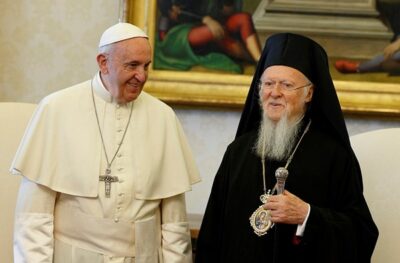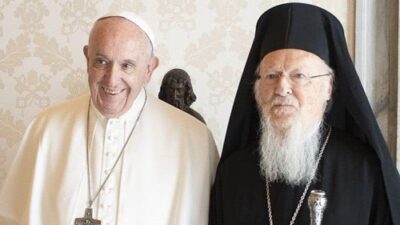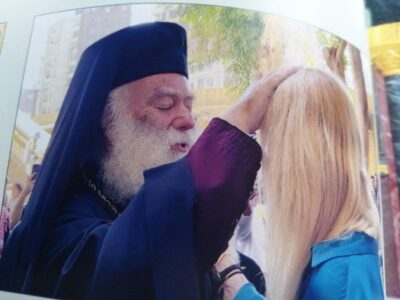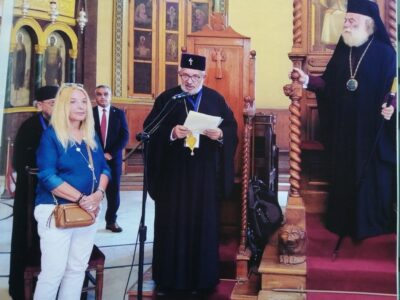EDITOR’S NOTE
(This article below, written by Fr. Peter Yates was obviously written before the death of Pope Francis. Nonetheless, it is now even more important than ever that our readers are aware of what was hoped for and actively being planned. The clear need for continued prayer for unity remains more urgent than ever. Let us hope an alternate avenue opens soon to achieve the unity that might have been achieved by Pope Francis and Patriarch Bartholomew next month).

Pope and Patriarch
The Christian faith is unique in its proclamation of the resurrection of the dead, having the raising of the Lord Jesus as the corner-stone of its faith from which all other elements of that faith, find their origin, explanation and meaning. No other faith can claim a similar teaching or any equivalent event in their history that would be comparable. Indeed, the first apostles used this distinctive fact to forward their assertions to their fellow-Jews and to seek to convince them that Jesus was the Messiah of God, the Chosen Anointed One and Saviour, God’s Christ.
The situation of our common ‘fall’ away from our Creator is described as a ‘spiritual death’ for humankind, which explains all that has gone wrong with relations between human beings ever since. It becomes yet more vivid and real to anyone through the experience of physical death. Faith in Christ’s resurrection brings with it the knowledge of the overcoming of this ‘spiritual death’ through His sacrificial death on the Cross and being raised from that death on the third day. So the resurrection constitutes the most powerful and exceptional event that has ever happened in human history. As we take this remarkable event on board, like the first apostles and disciples, we find ourselves compelled to ask: who is this Man, the subject of this unrepeatable event, and how are we to relate to Him? What does His life and death mean for each one of us?
This message of the resurrection has been passed on by Christians from generation to generation for 2,000 years as the very centre and core of the Christian faith.
But the first thing any contemporary Christian venturing into ecumenical circles will learn today is that the date the Churches celebrate this unique event of Pascha/Easter is different in Churches of the East and West. And this has not only been true ever since the schism of 1053, but controversy over the date of Easter goes back to the very earliest years of Christian history, to the second century and even before that.
We begin to realise that if the very foundation of our faith is celebrated on alternative dates in other parts of the Church, there is a real deficiency in our proclamation of it. In the eyes of anyone ‘on the outside’ of the Faith, such a variation immediately suggests weakness rather than strength, elements of doubt and uncertainty, wavering, and a raft of questions that all undermine the force and veracity of what is being proclaimed.
However, to this vexed question that has troubled the Christian Church for so long, we can now say that there is some light coming through at the end of the long dark tunnel.
And the year 2025 is in the privileged position of being the year that may see some positive developments, favourable for resolving this question that turns on this very core of our faith. This year is well placed because it is one of those few years that occur from time to time, when Easter is being celebrated on the same day by both Eastern and Western Churches. This year is also as we are all being joyfully made aware, the 1700th anniversary of the Council of Nicaea, which was the very first of the major Councils of the Church and which agreed (among other things) a doctrine of God – the Holy Trinity that has been used and observed by all the mainstream Christian Churches ever since.
Perhaps however, the most pressing and significant fact of all is that Pope Francis and the Ecumenical Patriarch Bartholomew are due to meet in Turkey during May and are planning to visit Nicaea together. It is hard to register how significant that meeting will be in the eyes of all who long for the unity of Christians. The meeting will build on all the previous encounters that have taken place between Pope and Patriarch since Pope Paul and Patriarch Athenagoras first met in 1964.
The date of Easter that has been a matter of controversy from the earliest times of the church is on the agenda for their meeting and statements are coming out of a great hope and confidence, that perhaps after so many long years, the two major Churches of East and West can arrive at a satisfactory agreement. In their earliest expression, those conflicts related to questions as to whether to rely on the Jewish dating of Passover (14 Nisan), which many Christians were alleging had been calculated incorrectly. The Council of Nicaea in 325 then became the occasion when the Jewish calendar was no longer to be used and there was an attempt to encourage uniformity but no method for calculating the date was agreed. Contrasting dates between East and West have arisen since Nicaea through their use of alternative Calendars, the Gregorian, or the Julian Calendars, for the purpose of calculating the date.
We should pray for the forthcoming meeting of the Pope and Ecumenical Patriarch who have been preparing for several years for this occasion, and especially for their efforts together in seeking agreement about the date of Pascha/Easter.
.

One date for Easter- Pope and Patriarch
In a letter to Patriarch Bartholomew sent last year on the feast of St Andrew, Pope Francis refers to this forthcoming visit to Nicaea:
Your All Holiness, the now imminent 1700th anniversary of the First Ecumenical Council of Nicaea will be another opportunity to bear witness to the growing communion that already exists among all who are baptized in the name of the Father and of the Son and of the Holy Spirit. I have already expressed several times my desire to be able to celebrate this event together with you, and I sincerely thank all those who have already begun working to make that possible. This anniversary will concern not only the ancient Sees that took part actively in the Council, but all Christians who continue to profess their faith in the words of the Nicene-Constantinopolitan Creed. The remembrance of that important event will surely strengthen the bonds that already exist and encourage all Churches to a renewed witness in today’s world. The fraternity lived and the witness given by Christians will also be a message for our world plagued by war and violence.
Dicastero per la Comunicazione – Libreria Editrice Vaticana
‘One date for Easter’ has likewise been a clarion-call for many years of the readers of the True Life in God messages, and especially of the Greek Orthodox mystic Vassula Ryden, who received those messages, which her followers believe to have been sent by God for this very purpose. Indeed, in one of the messages given to her, Jesus had said to her: ‘Unite the Dates of Easter, and I will do the rest;’(c.f. TLIG Message October 24, 1994)… meaning by that the bringing about of the unity of the churches of East and West. It would be an eloquent testimony to her memory (Vassula died last September from cancer) and to her near-40 years’ mission across the globe, visiting over 70 countries, and labouring tirelessly for the work of the unity of Christ’s churches..

Patriarch Theodore II of Alexandria and All Africa blesses Vassula and True Life in God on the Ecumenical Pilgrimage to Egypt in 2023.

Vassula, at St. George’s Church in Cairo, at the official reception by Patriarch Theodore II and Metropolitan Seraphim of Zimbabwe.
In Christ’s prayer for the unity of all who believe in Him, He prays: “As you Father are in me and I am in you may they also be in us, so that the world may believe that you have sent me.” (John 17:21) We cannot diminish for one moment, our work for re-awakening the Churches to the Lord’s call for unity since the very well-being and even survival of the world depends on it. In a world so torn by violence and war, we should be redoubling those efforts and especially this year with all the graces and opportunities this special celebration affords. If we can believe those words about the importance of celebrating the Paschal feast on one date, the witness of Christians in this world, already powerful in those countries where they regularly suffer martyrdom, can grow closer to the Lord’s intention ‘that the world may believe.
Peter CSWG
(Fr. Peter Yates has been with TLIG for many years. Vassula visited his Anglican monastery many years ago.)



